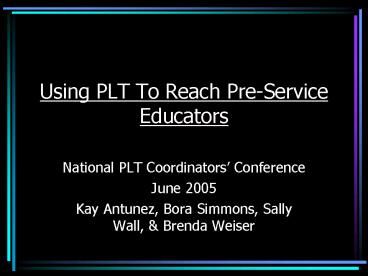Using PLT To Reach PreService Educators - PowerPoint PPT Presentation
1 / 18
Title:
Using PLT To Reach PreService Educators
Description:
Louise Fleming Ohio. Paulette Johnson - Pennsylvania. Martha Kuntz Washington ... Environmental Literacy of Candidates. Knowledge of Learning Theory and Learners ... – PowerPoint PPT presentation
Number of Views:24
Avg rating:3.0/5.0
Title: Using PLT To Reach PreService Educators
1
Using PLT To Reach Pre-Service Educators
- National PLT Coordinators Conference
- June 2005
- Kay Antunez, Bora Simmons, Sally Wall, Brenda
Weiser
2
Overview
- What is pre-service?
- Why is it important?
- Types of pre-service
- Who do you talk to for each type?
- NCATE Who is this and why are they important to
pre-service educators?
3
What is pre-service?
- People interested in being educators that are
still working on their degree or teacher
education certification courses - May or may not have a degree
4
Why is reaching pre-service educators important?
- Often looking for new ideas
- Have time to try new activities in some settings
(methods courses) - Developing integrated units and PLT lends itself
to this - Not tainted, open to new ideas
5
Types of Preservice Campuses
- University setting Community college
- Alternative certification
- Americorps
6
The University Setting and Community College
- Student profile of University Setting
- Student profile of Community College
7
Alternative Certification
- Profile of Alternative Certification student
- Elementary
- Secondary
8
Types of Alternative Certification Programs
- State Education Agency Sponsored
- College Sponsored
- Online Certification
9
How To Get In
- Universities and Community Colleges
- Alternative Certification Programs
10
NCATENational Council for Accreditation of
Teacher Education
- Environmental Education Standards
11
National Council for Accreditation of Teacher
Education
- Founded in 1954
- Professional accreditation of schools, colleges
and departments of education - Performance-based system of accreditation fosters
competent classroom teachers and other educators - 602 colleges of education currently accredited
with nearly 100 more seeking NCATE accreditation.
- Coalition of 33 Member Organizations of teachers,
teacher educators, content specialists, and local
and state policy makers. - NAAEE is a member of the coalition.
12
Writing Team Members
- Louise Fleming Ohio
- Paulette Johnson - Pennsylvania
- Martha Kuntz Washington
- Tom Marcinkowski Florida
- Kathy McGlauflin Washington, DC
- Bora Simmons Illinois
- Dan Sivek Wisconsin
- Al Stenstrup Washington, DC
- Margaret Tudor Washington
- Brenda Weiser Texas
- Terry Wilson - Kentucky
13
What we will be doing
- Developing environmental education program
standards - Providing input into the revision of the NCATE
Unit Standards - Providing input into the revision of program
standards developed by other groups (e.g., social
studies, science, elementary education)
14
The standards development process
- Using a public participation process
- Develop justification for EE standards
- Determine state-by-state status of teacher
certification/endorsement in environmental
education - Work with other professional organizations to
build relationships and support - Develop full, program review package
- Submit EE standards to NCATE
15
More on the process
- Background research conducted (2002-2004)
- Informational meeting held (Spring 2003)
- Writing team formed and met (Spring 2004)
- First draft sent to small group of environmental
education leaders to check general framework
(June 2004) - Initial draft available for public comment
(November 2004) - Writing team revises (Winter-Spring 2005)
- Second full draft available for review (Summer
2005)
16
The process (cont.)
- Writing team makes revisions based on input from
review - Continued review drafts available for comment
- Process continues until general agreement
reached
17
Draft Framework
- Nature of Environmental Education and
Environmental Literacy - Environmental Literacy of Candidates
- Knowledge of Learning Theory and Learners
- Curriculum Scope, Sequence Integration
- Knowledge of Instructional Settings, Resources
Technology - Knowledge of Instructional Strategies Practices
- Assessment
- Professionalism in Environmental Education
18
For more information contact ..Bora Simmons -
boras_at_niu.eduFuture drafts will be available
atwww.naaee.org































